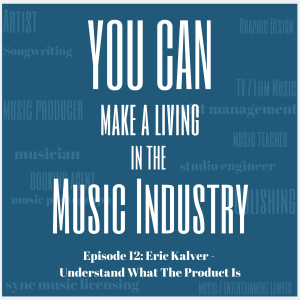

22.7K
Downloads
78
Episodes
Did you know that YOU CAN make a living in the music industry? Celebrities, working class musicians and people just like you who work behind the scenes in all areas of the music business will share their stories, encourage you and give you tools and how-to examples of the ways YOU CAN make a living doing what you love in the music industry.
Episodes

Monday Jan 20, 2020
Episode 12: Eric Kalver - Understand What The Product Is
Monday Jan 20, 2020
Monday Jan 20, 2020

This week I'm talking with music supervisor, composer and drummer Eric Kalver. Eric is in L.A. and stays extremely busy currently working for the video game publisher Activision. When he's not finding cool songs to put into video games, he is either composing music or playing drums in a bunch of different bands around L.A. He took time out to talk with me about his journey from being a magician's assistant (yes, you read that correctly) to being one of the top music supervisors in L.A.
Show Notes:
Sponsors: Edenbrooke Productions - We offer consulting services and are offering listeners a 1-hour introductory special. To request more info on consulting services, email Marty at contact@johnmartinkeith.com.
Talking Points:
*Eric grew up in a family of magicians.
*Check out The Amazing Eric and Bozo on You Tube.
*I went to Berklee School of Music for drumming and began taking arranging classes.
*I realized by doing arranging that would help me stick out of the crowd.
*A “lead sheet” is a music chart that is condensed so that it’s easy to read and on just a page or two so the whole band can read off the same sheet.
*I moved to L.A. sooner than I planned because people told me that the jobs would be gone if I waited.
*My first job in L.A. came because my father knew someone who produced the Daytime Emmy Awards and got me a job as a production assistant, moving chairs and sets and getting people where they needed to be.
*That got me work doing other entertainments jobs through the same company for about 3 months while I looked for music jobs.
*I was able to email and connect with a person from Berklee who lived in L.A. and eventually got me work as a copyist.
“Copyist work” has to do with the sheet music that is being played by an orchestra or player.
*I would take the master score the orchestrator was working with and I would extract the parts from the master score using a computer program called Finale.
*In Finale I would go into each instrument part and “clean it up" once it was extracted from the main score.
“Clean it up” meaning the spacing of the notes, making sure the notes make sense when you read them, cleaning up the dynamics, making sure things aren’t all over the place.
*A “copyist” is like a proof reader for a book editor.
*Having a network of like minded people who do the same kind of work as you who, if you get along with them and they trust your work ethic, then you can be recommended for jobs in the future.
*When networking, instead of offering my card to someone, it’s best if I get a person’s business card so they are the top of my mind and I can follow up with them because I may not be on the top of their mind.
*It’s better not to talk about the thing you want to network about until the other person brings it up.
*It’s all about “the hang.”
*Because of my Berklee connections I found a composer looking for an assistant. I got hired by Brian Tyler who worked on the Fast and Furious movies and Avengers: Age of Ultron.
*I didn’t study composing in college but I needed a job and was willing to learn and since Hollywood is a film scoring town, I applied for the job and I got it.
*When you’re an assistant to a composer, it’s not necessarily a job where you’re doing music the whole time.
*My job was more of an administrative job when I started. I was picking up laundry and lunch and running errands. That’s part of the job. They don’t tell you in school how to arrange the food and do hospitality, how to treat clients who are coming into the studio, etc.
*Attention to detail is important.
*Taking care of these details can prove to your boss that you can handle bigger tasks later on.
*Now, if I’m hiring a musician and they aren’t easy to hang out with it’s just not going to work.
*I got to do some orchestrating on the movies Fast Five and Skyline.
*As an orchestrator I was taking instrument parts and deciding how to split up chords that the composer created with the instrument.
*I eventually moved on and got a job at Alfred Music Publishing which is one of the main music education sheet music publishers.
*I got that job because of another connection from Berklee.
*I was the Choral Production Editor which meant I would take sheet music and proof read it for grammatical and musical errors.
*It’s another administrative job. I was helping organize the releases of choral music and helping create the covers with InDesign and editing the text.
*Through building relationships with the editors at Alfred Music Publishing and them learning what I went to school for, I got some percussion ensemble arrangements published through Alfred for Star Wars music.
*I did a Star Wars Themes Medley and Star Wars Cantina band for xylophone, marimbas, drums, bass, bells, mallets, etc.
*Then I learned about music supervision and applied to jobs and got hired as a music coordinator for a one stop shop.
* “One Stop Shop” means the company represents both “the master recording” and “the publishing” of a song. So the clearance process is very easy where I just reach out to one company who can approve both sides and it’s a relatively fast clearance process.
*I got that job at Heavy Hitters Music, not because of my musical background but from my administrative background at Alfred Music Publishing and for film composers doing copyist work and orchestrating.
*When I first started working for Heavy Hitters I was pitching music for the library to music supervisors, doing searches, guiding the company’s writers to help them know what we needed written.
*I then found a job at Activision through a referral. Now I was on the choosing side where before I was on the pitching side.
*Now I’m looking at budgets and terms, researching songs to find out where the ownership splits are.
*It’s like detective work.
*I then worked at Music and Strategy which is a company this is hired by ad agencies or specific brands as a hired music department to help with song clearance, creative ideas, negotiations, etc.
*I was working with big ad agencies creatively as well as clearance.
*Ad agency work is around the clock.
*I recently went back to Activision as a music supervisor and now I handle the music for the trailers, in game uses, internal uses, anything music related for the company.
*The music supervisor is the gate keeper to get your music in the door at a company but is not the final say. There are multiple people like directors and producers, etc. above me that have to like the music too.
*When you send an email to people like me you have to keep it short and sweet. Get to the point and tell me what you do. We are busy and don’t have time to read long emails.
*If you’re going to pitch music, you need to understand what the product is.
*What are some tips and advice for getting your foot in the door in the types of jobs you’ve had?
*Getting administrative skills down is very important to become a music coordinator. Knowing how to use Microsoft Word, Excel, knowing how to write an email and spell words correctly.
*You have to be able to do these things clearly because you’re writing to people requesting music rights, etc. so you have to be organized and have templates and spreadsheets with the status of where you are in the process.
*It comes back to networking and being a valid person that someone will vouch for you to get into these positions.
*When you’re trying to get into the music industry, you will have to do jobs that are not music related and that’s okay.
*It takes time. It’s hard work and stuff you didn’t expect to do but it all means something and can lead to something in the future
Raised by a family of magicians (seriously), Eric already had stage, TV, and radio experience by age 5. At age 11, the discovery of The Beatles and the movie "That Thing You Do" inspired him to become a drummer. 20 years later, he still gets to live the dream of working in music.
Eric wears multiple hats in the industry. He's the Music Supervisor at Activision Blizzard, working on games such as Call of Duty, Overwatch, Spyro, and Guitar Hero. He is a published arranger, a composer, and a regularly gigging drummer playing in multiple groups that perform all around the Los Angeles area.
You can regularly see Eric playing drums for Baby Wants Candy at Upright Citizens Brigade, weddings and corporate events with Business Time Entertainment, live band karaoke with The Moon Units,, and on the Netflix comedy special, Todd Glass: Act Happy.
No comments yet. Be the first to say something!